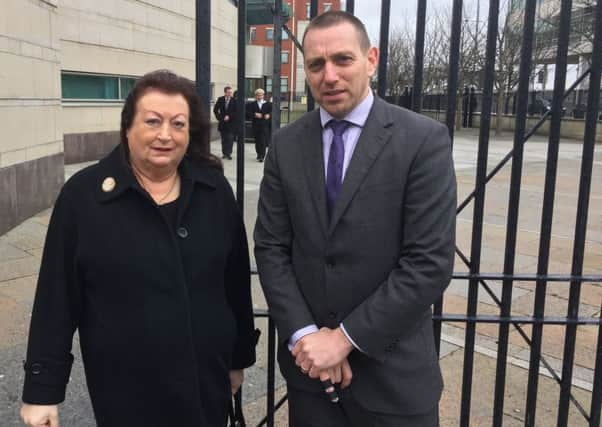MOD is not short of money for work on inquests into historic killings - Judge


Lord Justice Weir, who is conducting a review of more than 50 long-delayed inquests relating to the Northern Ireland Troubles, also questioned the Government’s commitment to uphold its international obligations to investigate the contentious deaths.
The judge was scathing when told the reason the MoD had missed deadlines for disclosing classified papers to the coroners’ courts was due to resource pressures.
“The MoD is not short of money,” he said.
Advertisement
Hide AdAdvertisement
Hide Ad“It’s busy all over the world fighting wars and it’s about to buy some new submarines with nuclear warheads - so it’s not short of money.”
He added: “This is obviously very low on their list of priorities.”
Northern Ireland’s Lord Chief Justice Sir Declan Morgan has asked judge Weir to assess the 56 stalled cases, relating to 95 deaths, to determine why they are still stuck in the coronial system, in some instances almost 45 years after the deaths.
Many of the delayed probes involve killings carried out by the security forces.
Advertisement
Hide AdAdvertisement
Hide AdOn the ninth day of the two-week exercise in Belfast’s Laganside Courts, judge Weir examined the cases of seven IRA men shot by the SAS in two separate ambushes in the early 1990s and the shooting of Belfast father-of-six Patrick McVeigh by the Army’s secretive Military Reaction Force (MRF) unit in 1972.
The Police Service of Northern Ireland’s Legacy Investigations Branch is currently investigating allegations the MRF committed numerous random attacks on civilians over a number of years in the 1970s.
Insisting that the MoD put more effort into handing over papers to the next of kin, judge Weir made clear the holding of investigations was not “optional”.
“It’s not like buying a new Jeep or getting a new regimental mascot,” he said.
Advertisement
Hide AdAdvertisement
Hide Ad“This is not an option - this is an international obligation on the State.”
He said the MoD argument that it was under resource pressure raised questions over the Government’s commitment to its obligations under international human rights laws.
“It doesn’t suggest any great intent on the part of government to comply with their obligations,” he said.
He told a lawyer from the MoD: “You want to avoid any suspicions that this approach is designed to prevent the matter being aired in a public arena, that it’s a deliberate attempt to delay and obfuscate - you want to avoid people thinking that. The best way to do that is let people see what you have got.”
Advertisement
Hide AdAdvertisement
Hide AdJudge Weir was also highly critical of the lack of disclosure from the PSNI in the McVeigh case, branding it “disgraceful” that “not one pick of paper has been given to the next of kin”.
In the case of IRA men Kevin Barry O’Donnell, Sean O’Farrell, Patrick Vincent and Peter Clancy, who were killed by the SAS in Clonoe, Co Tyrone, in 1992, the judge was told the MoD still had not disclosed documents to the court - more than a year after committing to do so.
“The MoD have been rather inclined to think they can thumb their nose at directions from the coroner and that they were quite free to abandon the promises they made,” said the judge.
“That’s not going to go on. There’s going to be a row at every one of these meetings if people don’t do things when they say they are going to do them.”
Advertisement
Hide AdAdvertisement
Hide AdThe four men were ambushed moments after they had opened fire on Coalisland police station with an anti-aircraft gun.
Judge Weir told an MoD lawyer that the days of “parking” requests from the court were over.
“We are not parking anything, any more,” he said.
He added: “People can expect to be hauled over the coals if they don’t do things they say they are going to do.
“No more putting stuff behind the clock - and you’d better tell the people in the MoD that.”
Advertisement
Hide AdAdvertisement
Hide AdThe MoD also faced criticism for its handling of the stalled inquest for IRA men Michael “Peter” Ryan, Anthony Doris and Laurence McNally, who were gunned down by the SAS in Coagh, Co Tyrone, in June 1991.
The judge was told one of the reasons the case was being held up was an unresolved issue between the MoD and PSNI about security vetting of papers.
Lord Justice Weir likened the apparent lack of action to fix the issue to a car getting a puncture.
“Instead of getting out and fixing it, the car just gets pushed into the ditch and left there,” he said.
Advertisement
Hide AdAdvertisement
Hide AdOutside court, Patrick McVeigh’s daughter, Patricia, welcomed the judge’s remarks.
“It’s been a long drawn-out process, we are trying to be patient,” she said.
“There is light now at the end of the tunnel after hearing Judge Weir today.”